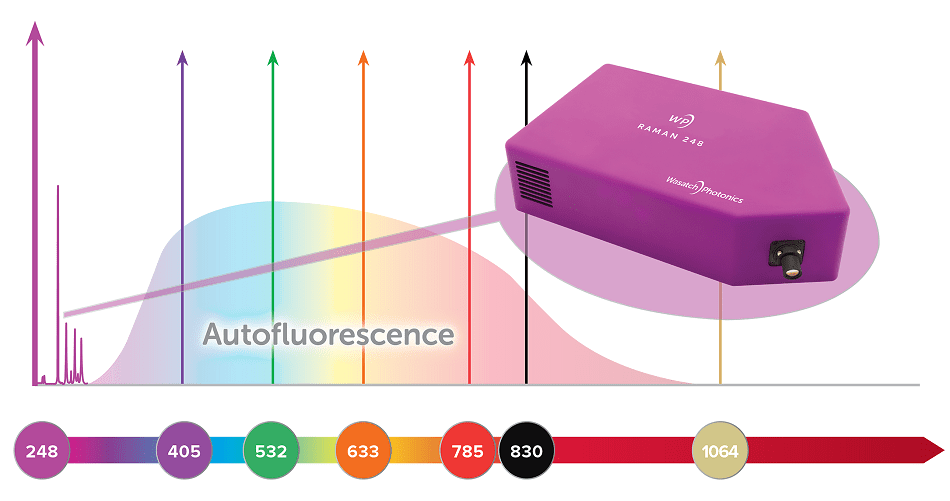
Wasatch Photonics is proud to announce the addition of a compact, cost-effective UV Raman spectrometer to its family of modular Raman spectroscopy products. The WP 248 Raman spectrometer expands on the company’s existing range of high sensitivity research and OEM Raman solutions spanning 405 to 1064 nm. Use of UV excitation makes the WP 248 ideal for fluorescence-free Raman spectroscopy, as well as UV resonance Raman (UVRR) to enhance sensitivity and selectivity. Applications range from gas detection and materials analysis to UVRR studies of structure and dynamics in biomolecules such as proteins and nucleic acids.
The WP 248 is a stand-alone UV Raman spectrometer with free space input and an f/2.0 design for superior signal collection and high throughput detection. It covers a range of 400 to 3200 cm-1 with 14 cm-1 resolution, and employs a UV-enhanced CCD for detection. It is designed for use with a compact 248.6 nm NeCu laser, and comes with a triggering cable to synchronize acquisition with the laser. Data collection and spectrometer control is included through the company’s own ENLIGHTEN™ operating software and software development kits for C/C++, C#, Python, LabVIEW, MATLAB, and other languages.
UV Raman offers several unique advantages for applications that may be challenging using visible and NIR excitation wavelengths. By exciting and collecting Raman spectra at wavelengths below 300 nm, UV Raman avoids interfering signal caused by native autofluorescence from the sample. This improves signal to noise for highly fluorescing samples, and enables trace detection of analytes within a more complex sample matrix. Applications include pressure measurement and trace detection of gases, as well as combustion studies, solid-state materials analysis, and characterization of strongly fluorescing beverages.
Careful choice of excitation wavelength can also enable UV resonance Raman (UVRR) spectroscopy, which offers 102-106 signal enhancement for select analytes, or specific subgroups within biomolecules. This combination of enhanced sensitivity and selectivity is invaluable in the study of structure, dynamics, and interactions of proteins and nucleic acids, and has contributed to our understanding of protein folding.
We’re delighted to add a compact, portable UV Raman spectrometer to complement our visible and NIR Raman solutions. Not only can we offer our customers more choices to find the right match for their application, but it demonstrates that we can adapt our technology to deliver quality spectroscopic data at any wavelength. This is exciting for us, because we know from experience that when we make Raman more compact and cost-effective without sacrificing sensitivity, new applications can find their way into the field. New problems can be solved, and that’s why we do this.
Dr. David Creasey, CEO, Wasatch Photonics
Wasatch Photonics’ new WP 248 Raman spectrometer offers high sensitivity in a compact footprint for modular UV Raman and UVRR spectroscopy. It covers both the fingerprint and functional range with choice of uncooled and TEC-regulated detector, and can be user-reconfigured with choice of free-space input or integrated lens. Like the company’s existing range of Raman spectrometers for 405, 532, 633, 785, 830, and 1064 nm wavelengths, the WP 248 is available off-the-shelf for applications in research and industry.